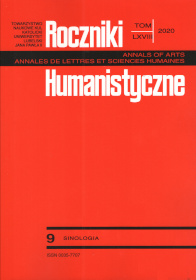Recovering a Lost Voice: Su Tong’s and Yu Hua’s Cathartic Fiction
Abstract
The Cultural Revolution left deep scars in the memory of the Chinese and strongly influenced Chinese literature, especially those works written by the generation who lived to experience its excesses. Yu Hua’s novels To Live and Chronicle of a Blood Merchant, as well as Su Tong’s Binu and the Great Wall of China, address the problem of the pain and traumas associated with Chinese history. The writers draw upon the traditions of storytelling in an attempt to overcome those traumas by creating new, linear, coherent, and even optimistic, tales about the past experiences of ordinary people, who are given a chance to narrate them against the dominant historical discourse. Walter Ong’s theory of orality and Michel Foucault’s concept of counter-history open up new possibilities of analysis, and help understand these cathartic prose works. A careful reading of Su Tong’s and Yu Hua’s novels also raises the question of the authenticity of the trauma recovery presented, and exposes the risk of complicity with the hegemonic discourse of history in silencing and repressing the traumatic memories that they face.
References
Bakhtin, Mikhail Mikhailovich. “From ‘Discourse in the Novel’.” Translated by Caryl Emerson and Michael Holquist. The Novel: An Anthology of Criticism and Theory 1900-2000, edited by Dorothy J. Hale, Blackwell Publishing, 2006, pp. 481-510.
Băniceru, Ana Cristina. “Going Back to One’s Roots: The Revival of Oral Storytelling Techniques in the English Contemporary Novel.” Romanian Journal of English Studies, vol. 9, no. 1, 2013, pp. 166-181, doi: 10.2478/v10319-012-0018-7.
Benjamin, Walter. “The Storyteller: Reflections on the Works of Nikolai Leskov.” The Novel: An Anthology of Criticism and Theory 1900-2000, edited by Dorothy J. Hale, Blackwell Publishing, 2006, pp. 361-378.
Berry, Michael. A History of Pain. Trauma in Modern Chinese Literature and Film. Columbia University Press, 2008.
Børdahl, Vibeke. “The Storyteller’s Manner in Chinese Storytelling”. Chinese Storytelling, www.shuoshu.org/Storyteller's%20Manner.pdf. Accessed 17.11.2019.
DeMeester, Karen. “Trauma and Recovery in Virginia Woolf’s Mrs. Dalloway.” MFS Modern Fiction Studies, vol. 44, no. 3, 1998, pp. 649-673.
Foucault, Michel. Society Must Be Defended. Lectures at the Collège de France, 1975-76, edited by Mauro Bertani and Alessandro Fontana, translated by David Macey, Picador, 2003.
Foucault‚ Michel. “What is an Author?” Language, Counter-Memory, Practice: Selected Essays and Interviews, edited by Donald F. Bouchard, translated by Donald F. Bouchard and Sherry Simon, Cornell University Press, 1977, pp. 113-138.
Higonnet, Margaret R. “Authenticity and Art in Trauma Narratives of World War I.” Modernism/modernity, vol. 9, no. 1, 2002, pp. 91-107, doi: 10.1353/mod.2002.0009.
Hockx, Michel. “The Involutionary Tradition in Modern Chinese Literature.” The Cambridge Companion to Modern Chinese Culture, edited by Kam Louie, Cambridge University Press, 2008, pp. 235-252.
Idema, Wilt L. Meng Jiangnü Brings Down the Great Wall. Ten Versions of a Chinese Legend. University of Washington Press, 2008.
Idema, Wilt L. “Old Tales for New Times: Some Comments on the Cultural Translation of China’s Four Great Folktales in the Twentieth Century.” Taiwan Journal of East Asian Studies, vol. 9, no. 1, 2012, pp. 25-46, nrs.harvard.edu/urn-3:HUL.InstRepos:15260024.
Lin Qingxin. Brushing History Against the Grain. Reading the Chinese New Historical Fiction (1986-1999). Hong Kong University Press, 2005.
Medina, José. “Toward a Foucaultian Epistemology of Resistance: Counter-Memory, Epistemic Friction, and Guerrilla Pluralism.” Foucault Studies, issue 12, 2011 (Special issue: Foucault and Race), pp. 9-35, doi: 10.22439/ fs.v0i12.3335.
Ong, Walter. Orality and Literacy: The Technologizing of the Word, Routledge, 2005.
Shay, Jonathan. Achilles in Vietnam. Combat Trauma and the Undoing of Character, Touchstone, 1994.
“Su Tong ‘Binu’ chongxie Meng Jiangnü chuanshuo 苏童《碧奴》重写孟姜女传说”, culture. wx216.com/ksz/xssj/4451.html. Accessed 1.08.2015,
Wang, Ban. Illuminations from the Past. Trauma, Memory, and History in Modern China, Stanford University Press, 2004.
Yang Xiaobin 杨小滨, “中国先锋文学与毛语的创伤 Zhongguo xianfeng wenxue yu maoyu de chuangshang.” 二十一世纪 Ershiyi shiji, no. 12, 1993, pp. 44-51, www.cuhk.edu.hk/ics/ 21c/media/articles/c020-199300005.pdf. Accessed 17. 11.2019.
Ze, David. “Walter Ong’s Paradigm and Chinese Literacy.” Canadian Journal of Communication, vol. 20, no. 4, 1995, www.cjc-online.ca/index.php/journal/article/view/894/800. Accessed 17.11.2019.
Copyright (c) 2020 Roczniki Humanistyczne

This work is licensed under a Creative Commons Attribution-NonCommercial-NoDerivatives 4.0 International License.





